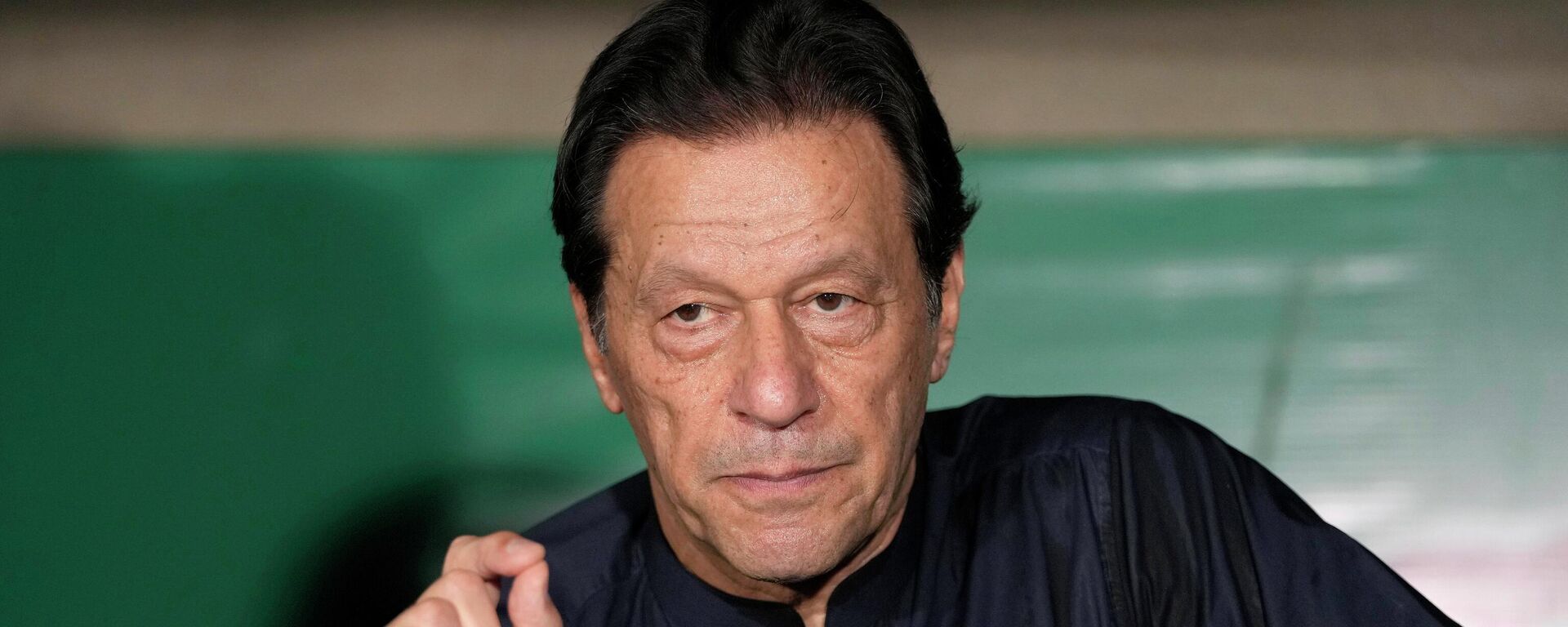https://sputniknews.in/20240322/why-imf-deal-is-a-double-edged-sword-for-pakistans-economy-6904303.html
Why IMF Deal is a Double Edged Sword for Pakistan's Economy
Why IMF Deal is a Double Edged Sword for Pakistan's Economy
Sputnik India
Pakistan is set to receive a $1.1 billion bailout package from the International Monetary Fund in an attempt to aid its dwindling economy, but some analysts... 22.03.2024, Sputnik India
2024-03-22T08:30+0530
2024-03-22T08:30+0530
2024-03-22T08:30+0530
shehbaz sharif
pakistan
islamabad
imf loan
economic crisis
economic challenges
inflation
https://cdn1.img.sputniknews.in/img/07e8/03/04/6739623_0:160:3072:1888_1920x0_80_0_0_b5c4b25203316dedccfe277518413d14.jpg
On Wednesday, Pakistan and the International Monetary Fund (IMF) reached a staff-level agreement on the final review of a $3 billion bailout package, where Pakistan will receive the last $1.1 billion after approval from the fund’s executive board.The announcement came after five days of talks between the IMF and the newly elected government of Prime Minister Shehbaz Sharif in Islamabad.The fund also stated that Pakistan will need more policy reforms to improve its economic situation. While IMF's monetary injections offer temporary solutions, the country faces more complex economic and political challenges.Pakistan's Debt Accumulation Sky RocketsPakistan is currently facing low economic growth at -0.5 per cent, coupled with a 25% inflation. Moreover, the 22% interest rate has negatively impacted the business environment with many multinational companies pulling out of the country. It also struggles with low foreign exchange reserves. To add to this grim economic picture Pakistan has accumulated a huge debt totaling over $130bn of external debt. Hence, this disparity between the rising debt and economic growth points to a widening crisis.Talking about the IMF loan and how it will impact the economy, the analyst explained that such loans are "unsustainable" and will likely push Pakistan's debt profile to an alarmingly high level.IMF Loans Result in Hardships for PakistanisA recent analysis by Tabadlab, a think tank based in Islamabad, also presented a bleak outlook on Pakistan's economic condition, calling its debt situation a "raging fire" and much more severe than the International Monetary Fund's evaluation of being “close to manageable.”According to the report, the debt levels are reaching alarming highs and Pakistan faces the prospect of an "inevitable default," which could trigger a devastating economic spiral.Last year the IMF demanded reforms in Pakistan’s energy sector, which had accumulated nearly $12.58bn in debt. The fund wanted policy implementation to overcome challenges in the energy sector by increasing the cost of electricity for the masses. Hence, the new bailout package being considered by the government will also come with tough austerity measures for Pakistanis.Lahore based business owner Arsalan Mahmood told Sputnik India that IMF policy reforms last year resulted in an all-time high inflation of 38%.According to the businessman, the country needs transformative change and reforms, otherwise the debt crisis will only worsen. “The country needs changes to the status quo and sweeping reforms by leaders who understand how dire the situation is and can find long-term solutions," Mahmood concluded.
https://sputniknews.in/20240224/imprisoned-imran-khan-appeals-to-imf-for-election-audit-before-new-loan-6658366.html
pakistan
islamabad
Sputnik India
feedback.hindi@sputniknews.com
+74956456601
MIA „Rossiya Segodnya“
2024
Aneela Rashid
https://cdn1.img.sputniknews.in/img/07e6/0c/0d/74548_0:0:485:484_100x100_80_0_0_821526e967ae85d041e2d30ee34fa1de.jpg
Aneela Rashid
https://cdn1.img.sputniknews.in/img/07e6/0c/0d/74548_0:0:485:484_100x100_80_0_0_821526e967ae85d041e2d30ee34fa1de.jpg
News
en_IN
Sputnik India
feedback.hindi@sputniknews.com
+74956456601
MIA „Rossiya Segodnya“
Sputnik India
feedback.hindi@sputniknews.com
+74956456601
MIA „Rossiya Segodnya“
Aneela Rashid
https://cdn1.img.sputniknews.in/img/07e6/0c/0d/74548_0:0:485:484_100x100_80_0_0_821526e967ae85d041e2d30ee34fa1de.jpg
shehbaz sharif, pakistan, islamabad, imf loan, economic crisis, economic challenges, inflation
shehbaz sharif, pakistan, islamabad, imf loan, economic crisis, economic challenges, inflation
Why IMF Deal is a Double Edged Sword for Pakistan's Economy
Pakistan is set to receive a $1.1 billion bailout package from the International Monetary Fund in an attempt to aid its dwindling economy, but some analysts feel that IMF’s policy demands will push millions of Pakistanis over the edge of poverty.
On Wednesday,
Pakistan and the
International Monetary Fund (IMF) reached a staff-level agreement on the final review of a $3 billion bailout package, where Pakistan will receive the last $1.1 billion after approval from the fund’s executive board.
The announcement came after five days of talks between the IMF and the newly elected government of Prime Minister Shehbaz Sharif in Islamabad.
The final decision to release this amount will take place in April by the IMF board in
Washington. According to the official statements by the fund, Pakistan’s economic and financial position has “improved in recent months”, but
economic growth is "expected to be modest this year and inflation remains well above target."
The fund also stated that Pakistan will need more policy reforms to improve its economic situation. While IMF's monetary injections offer temporary solutions, the country faces more complex economic and political challenges.
Pakistan's Debt Accumulation Sky Rockets
Pakistan is currently facing low economic growth at -0.5 per cent, coupled with a 25% inflation. Moreover, the 22% interest rate has negatively impacted the business environment with many multinational companies pulling out of the country. It also struggles with low foreign exchange reserves. To add to this grim economic picture
Pakistan has accumulated a huge debt totaling over $130bn of external debt. Hence, this disparity between the rising debt and economic growth points to a widening crisis.
"Rising debt levels are restricting economic growth, as they focus on consumption rather than productive investment. Moreover, interest payments now form a larger portion of the country's gross domestic product (GDP), adding to the seriousness of debt load," former unit manager of Engro Corporation and analyst Dr. Shahid Rashid explained to Sputnik.
Talking about the IMF loan and how it will impact the economy, the analyst explained that such loans are "unsustainable" and will likely push Pakistan's debt profile to an alarmingly high level.
"Just look at Pakistan's Stock Exchange, its GDP, and skyrocketing inflation and you will see how such loans are negatively affecting the economy. The government is thinking of entering a new long term bailout package with the IMF after concluding this one, but that only gives a temporary relief, and all factors point to Pakistan sliding towards a serious financial crisis, possibly a default," Dr. Rashid said.
IMF Loans Result in Hardships for Pakistanis
A recent analysis by
Tabadlab, a think tank based in Islamabad, also presented a bleak outlook on Pakistan's economic condition, calling its debt situation a "raging fire" and much more severe than the International Monetary Fund's evaluation of being “close to manageable.”
According to the report, the debt levels are reaching alarming highs and Pakistan faces the prospect of an "inevitable default," which could trigger a devastating economic spiral.
“Even if Pakistan were to avoid default, the agreement with the international lender such as the IMF means strict conditions when it comes to spending and structural reforms that further increase economic hardship for millions of Pakistanis,” Dr Rashid told Sputnik India.
Last year the IMF demanded reforms in Pakistan’s energy sector, which had accumulated nearly $12.58bn in debt. The fund wanted policy implementation to overcome challenges in the energy sector by increasing the cost of electricity for the masses. Hence, the new bailout package being considered by the government will also come with tough austerity measures for Pakistanis.
Lahore based business owner Arsalan Mahmood told Sputnik India that IMF policy reforms last year resulted in an all-time high inflation of 38%.
“The current government is seeking a quick fix to a long-term issue, but it will just increase a considerable burden for the salaried class of Pakistan, which is already struggling with inflation, unemployment and a lower quality of life,” Mahmood said.
According to the businessman, the country needs transformative change and reforms, otherwise the debt crisis will only worsen. “The country needs changes to the status quo and sweeping reforms by leaders who understand how dire the situation is and can find long-term solutions," Mahmood concluded.



